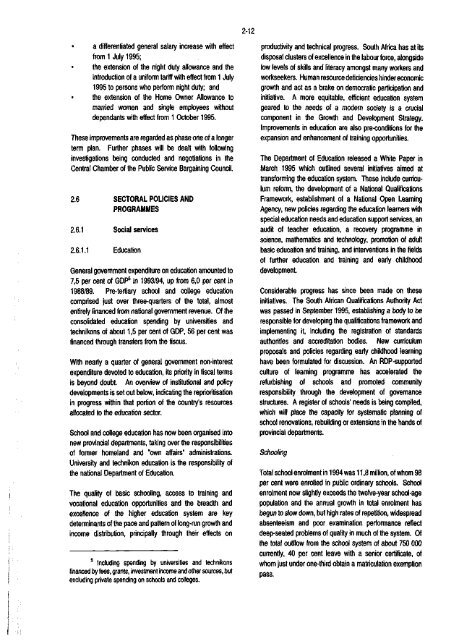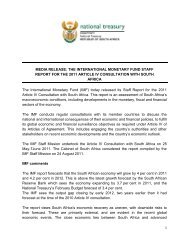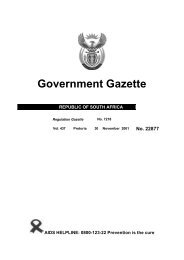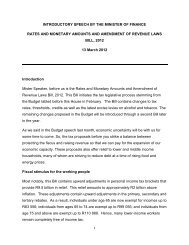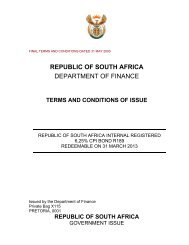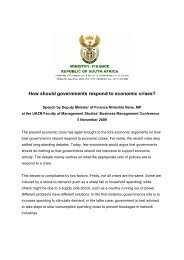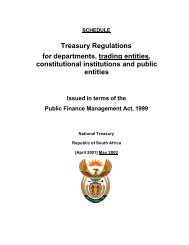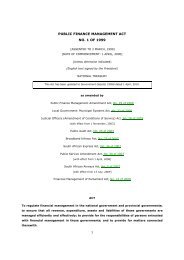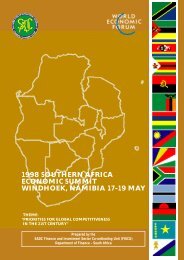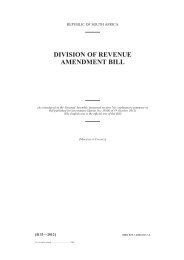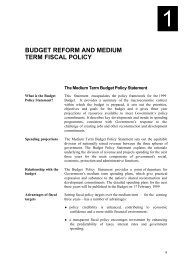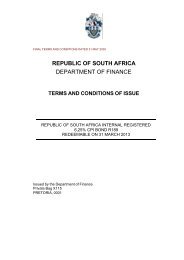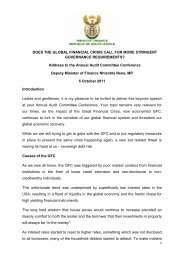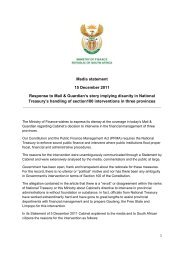1996 - National Treasury
1996 - National Treasury
1996 - National Treasury
Create successful ePaper yourself
Turn your PDF publications into a flip-book with our unique Google optimized e-Paper software.
2-12<br />
• a differentiated general salary increase with effect<br />
from 1 July 1995;<br />
the extension of the night duty allowance and the<br />
introduction of a uniform tariff with effect from 1 July<br />
1995 to persons who perform night duty; and<br />
• the extension of the Home Owner Allowance to<br />
married women and single employees without<br />
dependants with effect from 1 October 1995.<br />
These improvements are regarded as phase one of a longer<br />
term plan. Further phases will be dealt with following<br />
investigations being conducted and negotiations in the<br />
Central Chamber of the Public Service Bargaining Council.<br />
2.6 SECTORAL POLICIES AND<br />
PROGRAMMES<br />
2.6.1 Social services<br />
2.6.1.1 Education<br />
General government expenditure on education amounted to<br />
7,5 per cent of GDP 5 in 1993/94, up from 6,0 per cent in<br />
1988/89. Pre-tertiary school and college education<br />
comprised just over three-quarters of the total, almost<br />
entirely financed from national government revenue. Of the<br />
consolidated education spending by universities and<br />
technikons of about 1,5 per cent of GDP, 56 per cent was<br />
financed through transfers from the fiscus.<br />
With nearly a quarter of general government non-interest<br />
expenditure devoted to education, its priority in fiscal terms<br />
is beyond doubt. An overview of institutional and policy<br />
developments is set out below, indicating the reprioritisation<br />
in progress within that portion of the country's resources<br />
allocated to the education sector.<br />
School and college education has now been organised into<br />
new provincial departments, taking over the responsibilities<br />
of former homeland and "own affairs" administrations.<br />
University and technikon education is the responsibility of<br />
the national Department of Education.<br />
The quality of basic schooling, access to training and<br />
vocational education opportunities and the breadth and<br />
excellence of the higher education system are key<br />
determinants of the pace and pattern of long-run growth and<br />
income distribution, principally through their effects on<br />
5 Including spending by universities and technikons<br />
financed by fees, grants, investment income and other sources, but<br />
excluding private spending on schools and colleges.<br />
productivity and technical progress. South Africa has at its<br />
disposal clusters of excellence in the labour force, alongside<br />
low levels of skills and literacy amongst many workers and<br />
workseekers. Human resource deficiencies hinder economic<br />
growth and act as a brake on democratic participation and<br />
initiative. A more equitable, efficient education system<br />
geared to the needs of a modern society is a crucial<br />
component in the Growth and Development Strategy.<br />
Improvements in education are also pre-conditions for the<br />
expansion and enhancement of training opportunities.<br />
The Department of Education released a White Paper in<br />
March 1995 which outlined several initiatives aimed at<br />
transforming the education system. These include curriculum<br />
reform, the development of a <strong>National</strong> Qualifications<br />
Framework, establishment of a <strong>National</strong> Open Learning<br />
Agency, new policies regarding the education learners with<br />
special education needs and education support services, an<br />
audit of teacher education, a recovery programme in<br />
science, mathematics and technology, promotion of adult<br />
basic education and training, and interventions in the fields<br />
of further education and training and early childhood<br />
development.<br />
Considerable progress has since been made on these<br />
initiatives. The South African Qualifications Authority Act<br />
was passed in September 1995, establishing a body to be<br />
responsible for developing the qualifications framework and<br />
implementing it, including the registration of standards<br />
authorities and accreditation bodies. New curriculum<br />
proposals and policies regarding early childhood learning<br />
have been formulated for discussion. An RDP-supported<br />
culture of learning programme has accelerated the<br />
refurbishing of schools and promoted community<br />
responsibility through the development of governance<br />
structures. A register of schools' needs is being compiled,<br />
which will place the capacity for systematic planning of<br />
school renovations, rebuilding or extensions in the hands of<br />
provincial departments.<br />
Schooling<br />
Total school enrolment in 1994 was 11,8 million, of whom 98<br />
per cent were enrolled in public ordinary schools. School<br />
enrolment now slightly exceeds the twelve-year school-age<br />
population and the annual growth in total enrolment has<br />
begun to slow down, but high rates of repetition, widespread<br />
absenteeism and poor examination performance reflect<br />
deep-seated problems of quality in much of the system. Of<br />
the total outflow from the school system of about 750 000<br />
currently, 40 per cent leave with a senior certificate, of<br />
whom just under one-third obtain a matriculation exemption<br />
pass.


